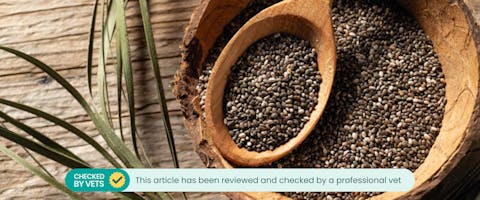Updated 10/10/2024
Chia seeds come from a flowering plant called Salvia Hispanica, which grows in Central America. These tiny seeds are packed with antioxidants and have been considered a superfood since ancient times. Legend has it that Aztec warriors could sustain themselves on just one tablespoon of chia seeds per day.
Now, while our furry friends might not gearing up for battle (though they may sometimes act like it), we’re curious about how these little seeds might benefit them. Today, we’re answering the question “Are chia seeds good for dogs?” and exploring the potential benefits of adding these tiny powerhouses to your dog’s diet.
Trending posts
Purr-use some of the top blogs our members have been loving this month- Top male dog names for your new furry friendGot a new furry family member in your pack? Check…

- Top female dog names for your new fluffy palWelcoming a new pooch into your family? Explore…

- 250+ gray cat names your silver feline will loveRecently welcomed a fluffy gray bundle of joy into…

- What are normal pet sitting rates?Discover the average pet sitting rates for animals…

- Unique dog names to stand out from the packDare to be different with our list of the best…

Are chia seeds good for dogs?
Loaded with omega fatty acids, antioxidants, fiber, and protein, chia seeds can be a wonderful addition to a balanced, nutrient-packed diet. Let’s take a look at some of the benefits of chia seeds for dogs:
Reduced inflammation
Chia seeds contain caffeic acid, an antioxidant that can help reduce inflammation in dogs and reduce the risk of related diseases.
Improved cognitive function
Chia seeds are an excellent source of omega-3 fatty acids, which can support healthy brain development in puppies and prevent brain disorders like canine cognitive dysfunction in older dogs.
Enhanced satiety
Chia seeds are high in soluble fiber, which means they soak up water (up to 12 times their weight!) and form a kind of gel in your pup’s stomach. This helps furry friends feel fuller for longer, keeping them satisfied and helping to prevent overeating and obesity.
Digestive system regulation
With 34 grams of fiber per 100 grams, chia seeds can help with all sorts of tummy troubles from constipation to diarrhea.
Blood sugar stabilization
Chia seeds can help regulate blood sugar levels by slowing the conversion of carbs into sugar, which could be beneficial for diabetic or pre-diabetic doggies.
Building muscle
While dogs should get most of their protein from animal sources, chia seeds can provide an extra boost to help pups build and preserve muscle mass.
Heart health
The omega-3 fatty acids in chia seeds promote a healthy heart and can help dogs with heart disease due to their anti-inflammatory properties.
Joint health
Chia seeds are rich in iron, magnesium, phosphorus, potassium, zinc, copper, and omega-3s, all of which support strong, healthy bones and joints.
Eye health
Omega-3s in chia seeds also help to maintain healthy eyes and vision – is there anything omega-3 can’t do?!
Fighting disease
Thanks to their high antioxidant content, chia seeds can strengthen the immune system and fight free radicals to reduce the risk of autoimmune disorders, arthritis, and even cancer.
How to give your dog chia seeds
It’s important to consult your vet if you’ve decided to feed your dog chia seeds, as they may not be suitable for every pup. While they have numerous health benefits, remember these seeds should never be used as a substitute for proper medical care.
Once your vet gives you the thumbs up, you can start incorporating chia seeds into your furry friend’s meals. Sprinkle them on top of their food, add them to homemade dog treats dog treats, or soak them in water so they expand and are easier to swallow. Your furry friend likely won’t mind what you do with them, as chia seeds don’t smell or taste of anything.
The amount of chia seeds dogs need to consume depends on their size and weight. A general guideline is ¼ teaspoon for every 10 pounds of body weight per day, but talk to your vet to find out the optimal dosage for your doggy.
So can dogs eat chia seeds? Yes, they’re safe for dogs to eat and can be a wonderful addition to your dog’s diet, offering health benefits like improved digestion, heart health, and enhanced cognitive function. However, you should always consult your vet before introducing your pup to anything new.
Ensuring your furry friend continues to receive the benefits of their nutritious diet is easy with the help of an in-home dog sitter. Our loving, verified sitters will maintain your dog’s regular routine and provide them with the care and attention they need when you’re not around. Plus, they can keep an eye on your furry friend’s overall health and well-being, giving you peace of mind that your precious pup is in good hands.
Meet our veterinary expert, Rebecca
This article has been checked by veterinarian Rebecca MacMillan, BVetMed MRCVS. Rebecca is a companion animal vet who has always had a passion for writing and client communication. Since her graduation from the Royal Veterinary college in 2009 she has gained a wealth of experience in first opinion small animal practice, in both clinical and managerial roles. She currently works in the South West and deals with a variety of routine and emergency appointments, but particularly enjoys medicine cases. Outside of work and writing, she enjoys spending time with her family, including her bouncy flat coated retriever George!

